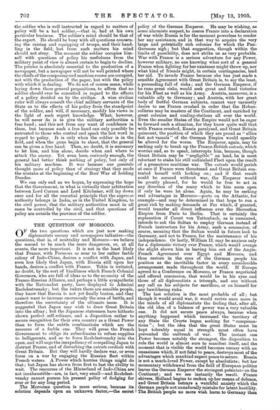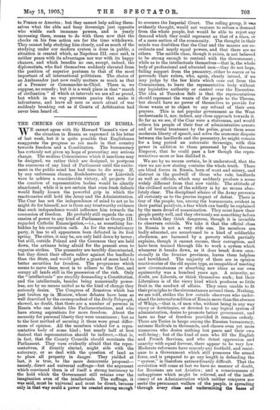O F the two questions which are just now making diplomatists
uneasy and newspapers talkative—the questions, that is, of neutrality and Morocco—we believe the second to be much the more dangerous, or, at all events, the more important. It is not in the least likely that France, with Formosa so near to her rather feeble colony of lade-China, desires a conflict with Japan, and even less likely that Japan, with Russia still upon her hands, desires a conflict with France. Tokio is irritated, no doubt, by the sort of kindliness which French Colonial Governors, who are full of ideas as to the necessity of the Franco-Russian Alliance, and perhaps a little sympathetic with the Nationalist party, have displayed to Admiral Rozhdestvensky ; but the rulers there are sensible people, they know that Russia is not yet finally beaten, and they cannot want to increase enormously the area of battle, and therefore the uncertainty of the ultimate issue. It is suggested that Japan may wish to draw Great Britain into the affray ; but the Japanese statesmen have hitherto shown perfect self-reliance, and a disposition rather to secure recognition for their own country as a Great Power than to form the subtle combinations which are the resource of a feeble one. They will press the French Government to oblige its subordinates to refuse supplies to belligerents, and so to force Rozhdestvensky into the open, and will urge the inexpediency of compelling Japan to distrust France, and of disturbing the entente corcUale with Great Britain. But they will hardly declare war, or even force on a war by engaging the Russian fleet within French waters. A Power which hurries things might do that ; but Japan has shown from first to last the ability to wait. The resources of the Hinterland of Indo-China are not inexhaustible—are, in fact, very small—and Rozhdest- vensky cannot pursue his present policy of dodging for ever or for any long period. The Moroccan question is more serious, because its solution depends upon an unknown factor,—the secret policy of the German •Emperor. He may be wishing, as some 'alarmists suspect, to coerce France into a declaration of war while Russia is for the moment powerless to render her any assistance, and in that way to acquire the very large and potentially rich colonies for which the Pan- Germans sigh ; but that suggestion, though within the limits of possibility, does not strike us as very probable. War with France is a serious adventure for any Power, however military, no one knowing what sort of a general France when fighting for her existence might throw up, nor what kind of friends might, in certain contingencies, lend her aid. To invade France because she has just made a sensible Agreement with Great Britain is, to say the least, a proceeding full of risks ; and the German Emperor, if he runs great risks, would seek great and final victories for his Fleet as well as his Army. Austria, moreover, is a valuable ally to Germany ; and Austria, with her great body of fretful German subjects, cannot very earnestly desire to see France crushed in order that the Hohen- zollerns may be masters of the Continent, and enriched by, great colonies and coaling-stations all over the world. Even the smaller States of the Empire would not be eager to forward such a situation, for they know quite well that with France crushed, Russia paralysed, and Great Britain quiescent, the position of which they are proud as " allies ' but not vassals" of the German Empire would speedily be altered for the worse. The Emperor, again, may be seeking only to break up the Franco-British entente, which worries and, so to speak, interrupts him, because, though Great Britain may be " negligible " on land, he is most reluctant to stake his still unfinished Fleet upon the result of a premature maritime war. The entente would perish at once if France were threatened and Great Britain con- tented herself with looking on ; and if that result could be secured without war, the Emperor would be greatly pleased, for he would be free to act in any .direction of the many which to him seem open if only he were let alone. Again, he may be seeking real advantages in Morocco—ports on the Atlantic, for example—and may be determined in that hope to run a great risk by making demands at Fez which, if granted, would transfer all direct influence over the Shereefian Empire from Paris to Berlin. That is certainly the explanation if Count von Tattenbach, as is rumoured, intends to ask the Sultan to employ German instead of French instructors for his Army, such a concession, of course, meaning that the Sultan would in future look to Germany, and not to France, for the maintenance of his independence. Or lastly, William II. may be anxious only for a diplomatic victory over France, which would avenge the slight shown him in leaving him out of the Anglo- French Agreement over Egypt and Morocco, and thus restore in the eyes of the German people his position as the inevitable factor in every considerable arrangement made throughout the world. If Europe agreed to a Conference on Morocco, or France negotiated and offered concession, that would be in his eyes and those of all diplomatists a triumph, and one without any call on his subjects for sacrifices, or on himself for any bewildering risks.
The last solution is the most probable of all ; but though it would avoid war, it would revive once more in the minds of all diplomatists the feeling that, after all, the old idea of a balance of power was a very valuable one. It did not secure peace always, because when anything happened which increased the territory of any State the Courts began seeking for " compensa- tions " ; but the idea that the great States must be kept tolerably equal in strength must often have prevented the outbreak of war. The instant one Power becomes notably the strongest, the disposition to rule the world is almost sure to manifest itself, and the moment that is visible the world becomes uneasy with an uneasiness which, if not fatal to peace, destroys most of the advantages which mankind expect peace to secure. Russia is not a much-loved Power, except by absolutists ; but her momentary withdrawal from the field of European politics leaves the German Emperor the strongest potentate on the Continent; and we see instantly the result. France shivers, Holland begins to reckon up her means of defence, and Great Britain betrays a watchful anxiety, which the German people not unnaturally mistake for latent hostility. The British people no more wish harm to Germany than to France or America ; but they cannot help asking them- selves what the able and busy Sovereign just opposite who wields such immense powers, and is yearly increasing them, means to do with them now that the checks on his free action are for the time withdrawn. They cannot help studying him closely, and as much of the studying under our modem system is done in public, a situation is created which, as Napoleon III, once said, is neither peace with its advantages nor war with its happy chances, and which benefits no one, except, indeed, the diplomatists, who find themselves suddenly elevated from the position of superior postmen to that of the most important of all international politicians. The choice of an Ambassador just now really matters as much as that of a Premier or Commander-in-Chief. There is, we suppose, no remedy; but it is a weak place in that "march of civilisation" of which at intervals we are all so proud, but which in no way prevents panics that make it infructuous, and leave all men as much afraid of war suddenly breaking out as if Courts of Arbitration had never been heard of.







































 Previous page
Previous page